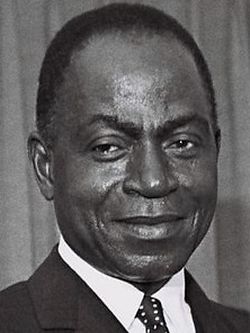
Cause of death: prostate cancer
Félix Houphouët-Boigny (French: [feliks ufwɛ(t) bwaɲi]; 18 October 1905 – 7 December 1993), affectionately called Papa Houphouët or Le Vieux ("The Old One"), was an Ivorian politician and physician who served as the first president of Ivory Coast from 1960 until his death in 1993. A tribal chief, he worked as a medical aide, union leader, and planter before being elected to the French Parliament in 1945. He served in several ministerial positions within the Government of France before leading Ivory Coast following independence in 1960. Throughout his life, he played a significant role in politics and the decolonisation of Africa.
Under Houphouët-Boigny's politically moderate leadership, Ivory Coast prospered economically. This success, uncommon in poverty-ridden West Africa, became known as the "Ivorian miracle"; it was due to a combination of sound planning, the maintenance of strong ties with the West (particularly France) and development of the country's significant coffee and cocoa industries. However, reliance on the agricultural sector caused difficulties in 1980, after a sharp drop in the prices of coffee and cocoa.
Throughout his presidency, Houphouët-Boigny maintained a close relationship with France, a policy known as Françafrique, and he built a close friendship with Jacques Foccart, the chief adviser on African policy in the regimes of Charles de Gaulle and Georges Pompidou. He aided the conspirators who ousted Kwame Nkrumah from power in Ghana in 1966, took part in the failed coup against Mathieu Kérékou in Benin in 1977, was suspected of involvement in the 1987 coup d'état that removed Thomas Sankara from power in Burkina Faso and provided assistance to UNITA, a United States-supported, anti-communist rebel movement in Angola. Houphouët-Boigny maintained a strong anti-communist foreign policy, which resulted in, among other things, severing diplomatic relations with the Soviet Union in 1969 (after first establishing relations in 1967) and refusing to recognise the People's Republic of China until 1983. He re-established relations with the Soviet Union in 1986.
In the West, Houphouët-Boigny was commonly known as the "Sage of Africa" or the "Grand Old Man of Africa". Houphouët-Boigny moved the country's capital from Abidjan to his hometown of Yamoussoukro and built the world's largest church there, the Basilica of Our Lady of Peace, at a cost of US$300 million. At the time of his death, he was the longest-serving leader in Africa's history and the third longest-serving leader in the world after Fidel Castro of Cuba and Kim Il Sung of North Korea. In 1989, UNESCO created the Félix Houphouët-Boigny Peace Prize for the "safeguarding, maintaining and seeking of peace". After his death, conditions in Ivory Coast quickly deteriorated. Between 1994 and 2002, there were a number of coups, a devaluation of the CFA franc and an economic recession; a civil war began in 2002.
Source : Wikipedia